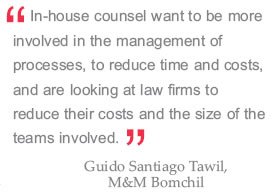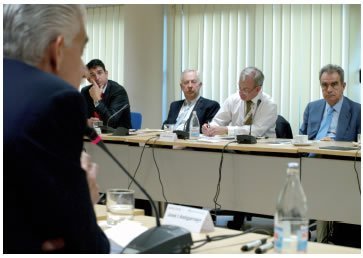The practicalities of “fast track” arbitration
The upturn in disputes as a result of the global economic crisis is placing pressure on the international arbitration community to speed up processes and reduce costs, and is seeing in-house counsel increasingly take more control of disputes, experts heard at a Master Class organised by Iberian Lawyer with Kluwer Law International in Madrid recently.
The wider economic situation means that General Counsel are now struggling with the dual challenge of dealing with an escalating number of business disputes and increasing pressure to reduce their internal and external legal spend. Parties in dispute are more closely evaluating arbitration costs and timescales, and in many cases seeking early settlement, while also looking for more success-fee type arrangements with their legal counsel.
Across the arbitration world, experts see four major trends emanating from the global financial crisis, explained Guido Santiago Tawil, Senior Partner at M&M Bomchil in Buenos Aires and Co- Chair of the IBAArbitration Committee.

‘There is a clear upturn in disputes in the finance and banking sectors with more financial institutions using arbitration clauses. There is also now much more negotiation although cases are often not so much settling out of persuasion but financial necessity. In addition, in-house counsel want to be more involved in the management of processes, to reduce time and costs, and are looking at law firms to reduce their costs and the size of the teams involved.’
There is therefore a drive towards ‘fast track’ processes, with shorter time scales, more settlement of smaller claims and a reduction in the number of expert witnesses and documents used.
David W Rivkin, arbitration partner at Debevoise & Plimpton in New York and London agreed. ‘The numbers of disputes are already up but an increase in the number of larger cases is still expected, as companies financial situations become more stable, and as more bilateral investment treaty (BIT) disputes emerge.’
He confirmed that there is growing concern over the time it takes proceedings to reach conclusion. ‘In many bigger BIT disputes it can take more than a year to determine jurisdiction or issue an award, while companies are worried about their month-to-month survival they simply cannot wait that long.’
It is therefore important that both arbitrators and arbitration institutions therefore focus on the concerns of clients and arbitration users, particularly those heightened by the financial crisis, he believes.
Open to attack
The Madrid Arbitration Court (Corte de Arbitraje de la Cámara de Comercio de Madrid) is among those seeing an increase in the number of arbitrations, says its President, Miguel Temboury. Figures already match those for all of 2008, average disputes are now in excess of €1m and there is a clear preference for fast track procedures for smaller claims.
‘Among our responses has been to introduce new rules aimed at offering more flexibility in proceedings and we are now looking at our fee scales. But we are also seeing a more confrontational attitude taken to disputes and reluctance in some instances to settle or to pay the other side’s costs.’
A similar situation is seen internationally. Disputes are on the increase at institutions including ICSID, AAA and ICDR, explained Carolyn Lamm, partner at White & Case in Washington and President of the American Bar Association (ABA), and parties are seeking to ‘slim down’ arbitration proceedings.
‘We are seeing parties preferring a single arbitrator over three, they are looking for lower fees, more online filing and to limit document production or engage in document only proceedings. Over all, clients want a more common sense approach and are looking to alter proceedings to increase efficiency.’
In very complex proceedings, lawyers note however, it often remains difficult to get full agreement between parties to agree to reduce elements of the arbitration process. In-house legal department clients want more training in arbitration issues and to have a more effective role in case management, to reduce costs, but they also want equality of treatment and to ensure due process.
‘Without full agreement, the result is that an award is susceptible to attack if a party claims it was not fully able to present its case,’ says Lamm.
The cost and expense associated with arbitration proceedings is an area of concern and a potential source of tension between parties, the arbitral institutions and arbitrators, noted John Beechey, President of the ICC’s International Court of Arbitration (ICA) in Paris. New fee scales and differential pricing, as well as assessing a variety of fast track options, are just some of the matters under consideration in the context of the current ICC Rules revision review.
‘We are looking at our own procedures to become more efficient and to reduce bureaucracy, and to try to ensure that arbitrators are available and awards are made in a timely manner,’ he added.
Luis Martinez of the International Centre for Dispute Resolution (ICDR) at the American Arbitration Association, likewise reported an increase in actions – up 40% on 2008 – and and noted that perhaps as a consequence of the economic crisis users are in some cases delaying the filing of the larger arbitration cases until they have a greater sense of their own financial position and what lies ahead.

In response the ICDR is conducting a test program where parties can select a reduced filing fee and pay as they go through the process.
‘We agree that more clarity would be useful, for example, on the use of expert witnesses, discovery and exchange of information processes, and are in favour of expedited processes, but also concerned about the potential criticism of awards as unfair if a party says they felt obliged to go down a certain route,’ said Martinez.
Tactical concerns
There is also a sense among lawyers that clients are increasingly using arbitration in a more tactical way.
“Parties are making a much greater cost-benefit analysis of proceedings and taking more of a ‘return on investment’ approach – for example, clients seem more willing to question the need for particular tasks or expenses in the arbitral process,’ said José Astigarraga, of Astigarraga Davis in Miami.
‘We are also seeing more tactical filings as part of a negotiation process. A party may not want to follow through with litigation or arbitration but filing proceedings can deliver a strong positional message.’
Early returns seem to indicate that cases are settling earlier in their life cycles, which is consistent both with the closer scrutiny of expenses as well as the use of proceedings as a negotiation tool.
Astigarraga reports one related trend: surveys reveal that in response to reduced legal budgets, corporate counsel are bringing some work such as writing first drafts of memoranda and other filings in-house.
The over arching trend, though, is that corporate counsel are looking for more fixed and alternative fee arrangements with their outside counsel, lawyers say.
Some question though whether the evident economic pressures are making for more efficient arbitrations, or whether many of the arbitration clauses being relied on are simply inappropriate for the fast track demands of parties. Others note that even those companies thriving in the current environment are applying the same fee pressures as those in more critical situations.
‘Clients want to cut costs and share risks and are looking at the applicability of success fees much earlier in the arbitration process. Many want a clear award in a short period of time and these are pressures that will not merely go away once the current crisis subsides,’ says José Antonio Cainzos, arbitration partner with Clifford Chance in Madrid.
An emerging issue also is whether arbitrators could or should be proactive in encouraging parties to settle.
‘A lawyer’s position will be heavily influenced by their cultural and legal background and which will have a clear impact on the efficiency of the process,’ noted Pierre Bienvenu, Senior Partner and Chair of the Arbitration group at Canada’s Ogilvy Renault and Co- Chair of the IBA’s Arbitration Committee ‘The Romano-German tradition sees arbitrators actively encourage settlement in contrast to the Anglo-Saxon tradition where this would be a conflict of interest.’
But while arbitration tribunals are obviously well placed to assess the relative merits of a case, issues also surround at what point it is appropriate to promote a settlement and the risk of breaching the impartiality of the tribunal and of due process. Any settlement will in any event require the consent of all parties.
‘There is a clear difference between the mediation and arbitration processes. Arbitrators should always support the parties if they wish to mediate but must avoid the tainting of their position if they take on that role,’ believes Claus Von Wobeser, partner at Von Wobeser & Sierra in Mexico City.
Lawyers have therefore to balance the increasing desire of clients to manage more of the arbitration process, and document and evidence collation, with the practical realities of keeping the process on track and on schedule – should negotiation fail.
Arbitration is no more immune to the cost pressures emanating from the global economic crisis than any other area of legal practice but what is new is the more active role in-house legal departments are beginning to take in the process, noted Jean Claude-Najar, Senior Counsel and Chief Compliance Officer, GE Commercial Finance, and Honorary Life President of the Corporate Counsel International Arbitration Group, who moderated the debate.
‘We are seeing a new paradigm, more micromanagement by arbitration users, more inducements to settle and a demand for more communication and ultimately more flexible procedures.’
Subscribe now to receive your copy of Iberian Lawyer











